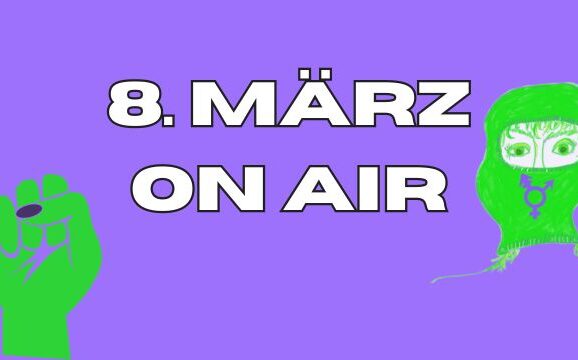A critical discussion around FLINTA*only spaces, policies and the usage of the FLINTA* term. And also thinking about what similar problematics can be seen with the term and usage of BIPoC.
Short context: FLINTA*only spaces want to invite women, lesbians, inter, non-binary, trans and agender persons – excluding all ends cis men as a given – but they very often exclude even more than that. The praxis in the usage of FLINTA*term and the praxis of FLINTA*Spaces are very often excluding trans people, inter, non-binary, agender people, gender questioning amab (addressed male at birth) people and trans people in eggmode, but also other marginalized groups are excluded from these spaces. Why? One of the reasons is that FLINTA*spaces stand in the history of (mostly white and middle class) women& lesbian spaces – this can still be felt today, when the needs of middle class white cis women and cis lesbians are centered in the designing and framing of FLINTA*spaces. The rules and codes, door policies, security measures and analyzation of structural violence follow this centering of white cis women and lesbians. In the end entering and existing in FLINTA*Spaces is often about passing: Do I pass as a women? Do I pass too much as a Man? Am I political correct enough? Is the way I talk suitable? Is the way I dress passable to get through a door? Am I too angry at the wrong things? Is the way I express anger passable? Am I too loud? A similar centering of certain groups within a group/acronym can also be perceived in the usage of the term BIPoC (Black, Indigenous, People of Colour) and BIPoC-Spaces, where also similar problems but in a different context occur.
In this radioshow we – B00STER CLUB – want to follow up on this thoughts and will also give a more detailed introduction on the topic. We will bring together different perspectives, experiences and struggles, also inviting friends. And of course: there will be music with all of this.
We want to especially invite everyone who is part of organizing FLINTA*and BIPoC spaces, or is used to using these terms on a daily basis to tune in.
We will switch between German and English bc the preference of the spoken language changes.
B00STER CLUB is a DJ collective/lab centering BIPoC, trans people and Queers. Focusing on community, building connections, sharing skills, mixing and empowering each other. B00STER CLUB is based in Vienna and hosts regular open Session ans Workshops.
+++++ DE +++++
“Ich bin nicht FLINTA genug” ist eine kritische Diskussion über FLINTA*-only-Räume, Einladungspolitiken und die Verwendung des FLINTA*-Begriffs. Und: Welche ähnlichen Problematik können beim BIPoC-Begriff und deren Verwendung beobachtet werden?
Kurzer Kontext: FLINTA*only-Räume wollen Frauen, Lesben, inter, nicht-binäre, trans und agender Personen einladen – wobei sie alle endo cis Männer ausschließen -, aber sie schließen dabei sehr oft mehr als endo cis Männer aus. Die Praxis in der Verwendung vom FLINTA*Begriff und die Praxis von FLINTA*Räumen schließen sehr oft trans Menschen, inter, nicht-binäre, agender Menschen, genderquestioning amab (adressed male at birth) Personen und trans Menschen im eggmode aus – aber auch andere marginalisierte Gruppen sind von diesen Räumen ausgeschlossen bzw werden Zugänge erschwert. Warum? Einer der Gründe ist, dass FLINTA*Räume in der Geschichte von (meist weißen und mittelclass) Frauen- und Lesbenräumen stehen – dies ist auch heute noch spürbar, wenn die Bedürfnisse weißer cis Frauen und cis Lesben bei der Gestaltung und Rahmung von FLINTA*Räumen im Mittelpunkt stehen. Die Regeln und Codes, die Türpolitik, die Sicherheitsmaßnahmen und die Analyse der strukturellen Gewalt folgen dieser Zentrierung von weißen middle class cis-Frauen und Lesben. Letztendlich geht es beim Betreten von und Existieren in FLINTA*Räumen oft um das Passing: Gehe ich als Frau durch? Gehe ich zu sehr als Mann durch? Bin ich politisch korrekt genug? Ist die Art, wie ich rede, angemessen? Ist die Art, wie ich mich kleide, geeignet, um durch eine Tür zu kommen? Bin ich zu wütend über die falschen Dinge? Ist die Art und Weise, wie ich meine Wut ausdrücke, passabel? Bin ich zu laut? Eine ähnliche Zentrierung bestimmter Gruppen innerhalb einer Gruppe/Akronym kann auch in der Verwendung des Begriffs BIPoC (Black, Indigenous, People of Colour) und BIPoC-Spaces wahrgenommen werden, wo ebenfalls ähnliche Probleme, aber in einem anderen Kontext auftreten.
In dieser Radioshow wollen wir – B00STER CLUB – diesen Gedanken nachgehen und eine noch detailliertere Einführung in das Thema geben. Wir werden verschiedene Perspektiven, Erfahrungen und Kämpfe zusammenbringen und dazu auch Freunde einladen. Und natürlich gibt es zu all dem auch Musik.
Wir möchten insbesondere alle einladen, die an der Organisation von FLINTA*- und BIPoC-Räumen beteiligt sind oder diese Begriffe im Alltag verwenden.
Die Sendung wird englisch und deutsch gemischt sein, da die sprechenden Personen unterschiedliche Sprachen präferieren.
B00STER CLUB ist ein DJ-Kollektiv/Lab, centering BIPoC, trans Personen und Queers. Der Fokus liegt auf Community, Verbindungen knüpfen, skills teilen, mixen und sich gegenseitig zu empowern.
B00STER CLUB ist ein Wiener Kollektiv und hostet regelmäßige Open Sessions und Workshops.










